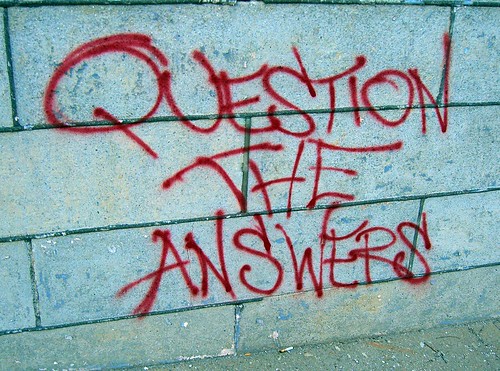In a previous post I explored the idea that a form of learned helplessness is to blame for executives and L&D's inability to accept and embrace social & informal learning in their organizations. Simply put, my argument was that after years of "control" by formal learning (public education, higher education and training organizations) there may be a well entrenched belief that the only path to learning is via push methods.
I believe that another related issue may be at play - Cognitive Dissonance. If you're unfamiliar, this is the mental stress that results from having conflicting cognitions such as when a cigarette smoker reacts to dramatic data on lung cancer rates with a "eh, gotta die someday." Or a person, having the belief that abortion is an abomination, can justify voting for the pro-death penalty candidates. Or the religious zealot who exclaims that when doomsday didn't arrive as planned, it must have been due to their strong beliefs.
Simply put - the more one invests in an idea/ belief, the stronger one works to justify their position on that issue.
When you think about the amount of money, time and staffing that's pumped into formal learning in the face of more and more research showing how ineffective it can be, it's no wonder only the most progressive are able to break their shackles to traditional training and L&D approaches. Those with more conflicted cognitions engage in the simple act of dismissing the evidence. Do they eliminate or discount the other argument because they are justifying the investment?
If there is something to this then simply throwing more data at them isn't the solution as it may only serve to solidify their entrenched position.
I stumbled upon this short research on AIDS prevention summary which was challenging the notion of education alone to curb dangerous sexual behavior. In the study the evidence showed that educational efforts that induced fear were not enough to change young people's behavior. The youth agreed that AIDS was a problem, just not that it was their problem. The approach then was to make a departure from the fear campaign and instead to create a form of cognitive dissonance by exposing their own hypocrisy to get them to practice what they preach.
The results indicated that those who were put in a position where they had to address their own contradictions were more likely to take corrective/positive action to rectify it.
When it comes to a lack of support for social and informal learning, the fact is most leaders (corporate and L&D alike) do not engage in formal learning themselves yet they support its use as the default, and often only, means to improve worker performance - Hypocrisy?
I agree that in many cases, when given the opportunity, small proof of concept informal/social learning pilots can produce good data and should not be abandoned as an approach. However, maybe the AIDS behavior modification approach holds an opportunity for changing organizational learning strategy and investment. If yes, then the question is: How do we help our leaders to do more self-reflection to expose their hypocrisy?

2 comments:
Hi Mark. Great article on informal learning. It's true that there is often resistance to informal learning in corporate situations, and I definitely agree that the traditional formal mindset plays a big role.
The question you posed, "How do we help our leaders to do more self-reflection to expose their hypocrisy?" is such a relevant one but such a tough one to answer! Critically examining yourself is difficult enough, never mind asking someone else to do the same.
I reckon that the best way to encourage change in this way is to foster an environment of ongoing learning, where failure is used as motivation for ongoing learning, not as a judgement of character as it can often be taken.
Thanks Sarah. I agree more failure toleration is needed. And leaders hiring creative passionate people must recognize that failure (when coupled with reflection opportunities) would go a long way to helping organizations achieve innovation. I'd also say that increased openness and transparency (where people narrate their work and their learning including executives) would help reveal the informal ways people are learning at all levels. Writing in public (blogging)is a reflective exercise like no other - influencing our own thinking and stimulating others.
Post a Comment